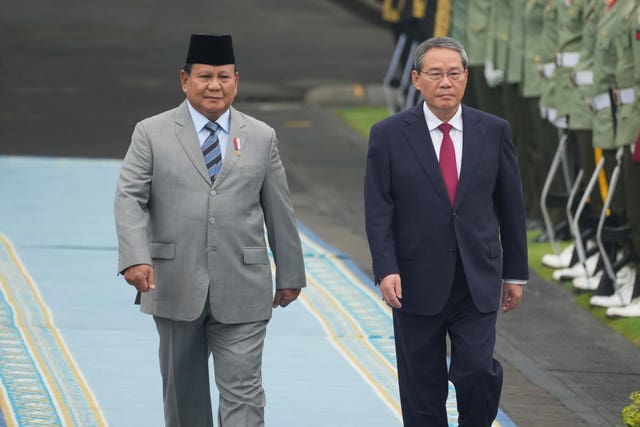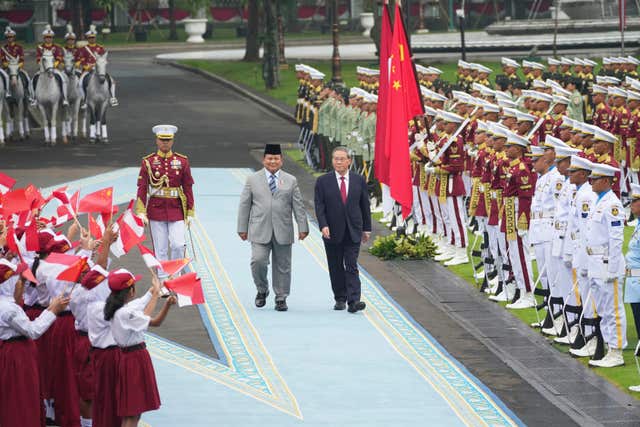Chinese and Indonesian leaders meet to discuss expanding trade
It comes amid the trade war sparked by US President Donald Trump.

Chinese Premier Li Qiang has met with Indonesia’s President Prabowo Subianto to discuss ways to expand trade and investment during the US global trade war and as economic globalisation faces headwinds.
Mr Li arrived in Indonesia’s capital, Jakarta, on Saturday afternoon for a three-day visit to south-east Asia’s largest economy. It was the first stop of his first overseas visit this year.
Indonesia and China are member states of the Group of 20 major developing countries and emerging economies and of Brics.
Mr Li brought 60 prominent Chinese businesspeople for his address to the Indonesia-China Business Reception on Saturday evening. He emphasised in his remarks that China’s economy has achieved rapid growth this year despite increasing external challenges.
“The current international situation is a stalemate,” Mr Li said at the event which was also attended by Mr Subianto, “Unilateralism and protectionism are on the rise, bullying behaviour is increasing.”

Mr Li noted this year marks the 70th anniversary of the Non-Aligned Movement which was held by Asian and African countries in Indonesia’s Bandung city, when the world was at a historical crossroads more than seven decades ago.
The Bandung spirit of solidarity, friendship and co-operation has played a pivotal role in the unity and co-operation of the Global South countries, Mr Li said.
“More than seven decades later, the world is once again at an important crossroads,” he said.
He called on all countries to seek common ground while resolving differences through dialogue and peaceful co-existence.
Mr Subianto expressed gratitude to the Chinese government and its companies “that have participated in our economy, created jobs, transferred technology and built trust among all businesses, especially in our homeland”.
He also invited Chinese businesspeople to invest more in Indonesia. Two-way trade exceeded US$147.8 billion last year, growing by 6.1%.

Mr Li said for nine consecutive years, China has been Indonesia’s largest trading partner, and its Belt and Road co-operation programme has seen substantive progress, including nickel smelting plants and Whoosh, the commercial service of south-east Asia’s first high-speed railway which has been operating since October 2023, carrying nearly 10 million passengers.
Indonesia wants a larger role in supplying nickel and other raw materials to China’s fast-growing electric car makers.
On Sunday, Mr Subianto hosted Mr Li in a ceremony at Merdeka Palace in Jakarta before the two leaders held a bilateral meeting behind closed doors.
“The current international situation is facing a huge upheaval, and peaceful development is facing many uncertain and unstable factors,” Mr Li said in his opening remarks.
China wants to strengthen its traditional friendship and the Belt and Road Initiative partnership with Indonesia, especially in five key pillars: politics, economy, maritime affairs, security, and cultural and people-to-people exchanges, he said.
The two leaders oversaw the signing of a dozen agreements, including co-operation to encourage bilateral transactions in local currencies, trade, investment, tourism, health and agricultural exports.
Mr Subianto emphasised the close historical relationship between Indonesia and China and said the two countries are at an important moment in the history of bilateral relations.
“I reiterate our commitment to strengthening our comprehensive strategic partnership with the people and the government of China,” he said. “We see this will bring goodness not only to the two countries, but also to the entire Asian region.”





